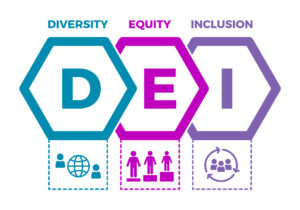2022 will be the ‘Year of Accountability’
Consider these recommendations for approaching fresh DE&I goals in the year ahead.

What a year it’s been: a pandemic, a lockdown, record unemployment, continued racial reckoning, protests, an attack on the capital, inflation, an expanding wealth gap, an abortion rights struggle and fraying civil discourse.
All of it prompts every American to reflect on who we are in this society, where we fit, and with whom we want to associate. In the meantime, everyone’s weighing in on social media, ready to put transgressors on blast. Today’s culture has become a minefield, especially for brands.
Since mid-2020, brands have increasingly spoken up about social injustice. In 2022, we will look closely at how brands have done. It will be the Year of Accountability. And the bar is high.
The mood, depending on where you spend your time, is arguably sour. Two in five adults we recently surveyed say civil discourse has become more difficult in the last year, with most calling the internet the “main cause” of uncivil discourse. Online disputes have cost (59%) of millennials and 54% of Gen Xers relationships.
As the diversity, equity and inclusion (DE&I) lead for a global communications agency, I’ve had the opportunity to witness first-hand the growth and evolution of brands who are committed to remaining relevant, and creating community and belonging for their customers in an ever-changing world. I’ve witnessed companies stand boldly and vulnerably in their efforts to change. I’ve watched companies say the right things, then revert to the comfortable and familiar. There are challenges, opportunities and consequences attached to both approaches.
Leaning into DE&I as a strategy for business growth and sustainability can require a level of discomfort. Yet a “head in the sand” approach will eventually render a brand irrelevant in modern society. We are in what my late, southern grandmother from Kentucky would refer to as a “piss or get off the pot” moment in the world of DE&I.
Here are some recommendations for brand owners as they approach today’s volatile commercial landscape:
- Don’t hide. The need for everyone to feel included, respected and treated fairly is now thoroughly woven into our civic fabric, especially for younger generations. Organizations will be held more accountable now than ever for their DE&I efforts. Proactively report, or at least prepare to disclose, how your brand has recently made measurable progress in diversity, equity and inclusion. Be specific: Include stats on your workforce, business partners and marketing. Have a transparent plan for 2022 and beyond.
- Include everyone. America is rapidly diversifying, with the country on track to be a majority “minority” nation in 2045. The younger the cohort, the bigger the minority portion will be. And while diversity makes multiethnic and multigenerational marketing critical, brands should also make authentic, visible efforts to engage other types of potentially marginalized people, including those of different abilities, body types, incomes, educations, genders and political leanings. If your audience doesn’t see themselves in you, why would they choose you over competitors?
- Be sensitive to semantics. “BLM” and “DE&I”—though viewed favorably by the majority of adults, according to our research—can be polarizing terms as opposed to, for example, “belonging.” And “critical race theory,” a net negative among Gen X and Boomers, is actually viewed positively by a majority of Gen Z and millennials. I can’t tell you here what your particular brand should say about current affairs, much less what terms to use. But in a divided world, understand how any terms you use may carry unintended messages, or trigger unnecessary resistance.
Although I’d love to give you permission to stay on the sidelines with respect to DE&I and social justice, you cannot. If you’re selling to anyone under 40, you ignore civil engagement at your own risk. Half of Gen Z (49%) thinks brands should get involved in political and social issues, as do nearly as many millennials (44%). The rates are lower, but still substantial, with Gen X (41%) and Boomers (29%).
Can you authentically involve your brand in the things you care about without alienating those who don’t want to hear your opinion? It would be a neat trick. The upshot is that brands need to authentically address multiple consumer personas in specific ways, while also remaining coherent.
Is that even possible?
Oh yes. It absolutely is. Rihanna’s Fenty brands of cosmetics and lingerie have led the way in demonstrating how to do this over and over again. For Fenty, inclusion and belonging isn’t a program, or even a core value. It is their business. They fundamentally built the organization around a model to celebrate the beauty in every woman. Designing inclusive products was not an afterthought; it was the assignment.
The right way
On the cosmetics side, Black and brown women have long struggled to find the foundation that matches their skin tone mainly because the typical beauty brand offers around a dozen shades (no, that’s not a lot). In Fenty Beauty, Rihanna came in with at least 50 shades, addressing not only Black and brown women’s needs for half-tones, but also everyone’s. She did something similar with lingerie, entering the market from the start with a variety of Savage X Fenty sizes, and considered making items comfortable as well as sexy.
In retrospect, this “simple” inclusive approach hastened the demise of erstwhile lingerie juggernaut Victoria’s Secret, a brand whose garments seemed more designed for the beholder than the owner. You’ve got to love that Rihanna’s brands were inclusive from their conception; they didn’t need to “pivot” to be inclusive.
Whatever you sell, the inclusion challenge will be big and complex in 2022. But in another way, it’s simple. With accountability paramount, it’s no longer enough to say the right things. It’s now time to either be the brand your customers expect from the start, or become it. Today.
What a year it’s been—and what a year it will be.
Angela Hayes is SVP for Diversity and Inclusion at Brodeur Partners.






